
You might feel anxious about AI taking over, especially as it becomes more involved in our jobs and lives. However, AI doesn't so much replace you as augment and assist in your tasks. It streamlines massive data analysis and optimizes logistics, letting you focus on complex problem-solving and creative thinking. More importantly, while AI enhances efficiency, it can't replicate human empathy, creativity, or moral judgment—skills that you uniquely bring to the table. There are roles only humans can fill, and as you adapt, new opportunities will arise. Exploring how AI complements human effort could open up even more possibilities for your future growth.
The Evolution of AI Technology
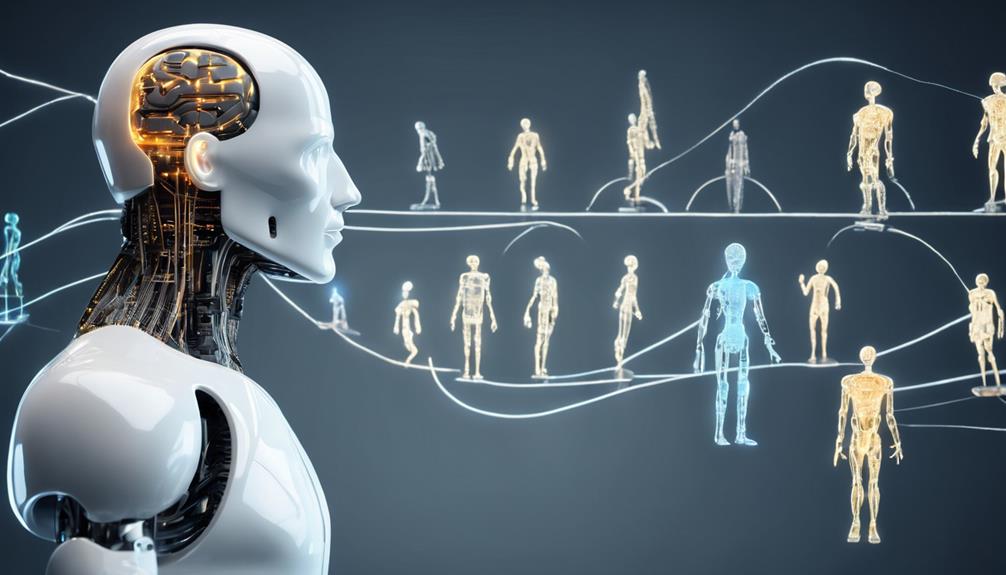
AI technology has evolved rapidly, transforming how you interact with the digital world. It's no longer just about clunky robots or simple automated responses. Now, AI is integrated into your daily life, often without you even noticing.
From personalized recommendations on streaming platforms to voice-activated assistants in your home, these advancements are designed to make your life easier and more connected.
You're also seeing AI in ways that might surprise you. For instance, it's behind the smart algorithms that help navigate your car, manage your home's energy efficiency, or even monitor your health through wearable tech. These developments have made AI not just a tool of convenience but a potentially life-altering presence in many aspects of your life.
What's more, AI is getting smarter. It learns from your behaviors, adapts to your preferences, and increasingly anticipates your needs. This level of personalization is possible because of machine learning, a type of AI that evolves based on the data it processes.
You're experiencing a world where technology not only assists but also adapts and grows. This is just the beginning of a continually evolving relationship between you and the machines you interact with daily.
AI in the Workplace: Trends
You're increasingly encountering AI at your workplace, where it streamlines tasks and boosts efficiency. From managing large datasets to automating routine inquiries, AI's role is becoming indispensable across various industries. It's not just about heavy lifting in data anymore; AI is also enhancing decision-making processes by providing deeper insights and forecasts.
Consider customer service; AI chatbots now handle initial customer interactions, making them quicker and more precise. They're programmed to learn from each interaction, constantly improving their responses. In healthcare, AI assists in diagnostic processes, analyzing scans with a precision that matches, and sometimes surpasses, human experts.
Moreover, AI integration into project management tools helps you track progress and manage tasks effectively. It predicts potential delays and suggests optimal workflows, which ensures better resource allocation. In creative fields, AI tools are offering new ways to design and edit, significantly cutting down the time you spend on iterative processes.
These trends indicate a shift towards a more AI-integrated workplace where the technology isn't just a tool, but a collaborator. It's reshaping how you work, learn, and solve problems, paving the way for more innovative and efficient work environments.
Human Jobs Vs. AI Automation
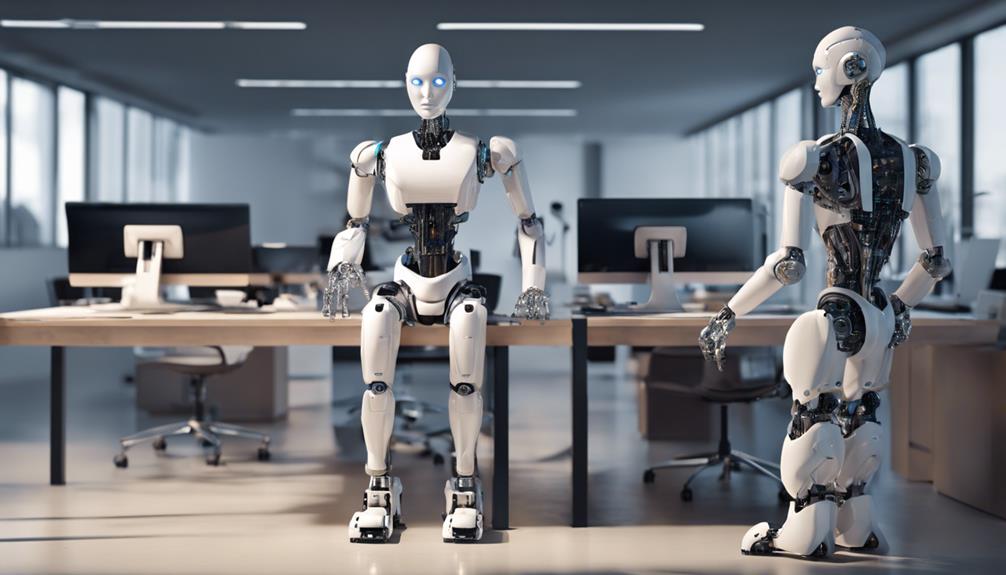
Many professionals worry that increasing automation might threaten their job security as AI takes on more complex roles. You might find yourself questioning where you'll stand in a rapidly evolving job market. It's a valid concern, as AI systems can analyze data, manage logistics, and even interact with customers, often faster and more efficiently than humans.
Yet, it's not all doom and gloom. While AI can perform certain tasks, it can't replicate human creativity, empathy, or critical thinking. This means your ability to adapt, innovate, and connect emotionally is more crucial than ever. You have opportunities to shift into roles that require these uniquely human skills, even as AI handles more routine or data-heavy tasks.
Moreover, the rise of AI could enhance your job rather than replace it. By automating mundane tasks, AI frees you up to focus on more complex and rewarding aspects of your work. This shift can lead to higher job satisfaction and better overall performance.
Case Studies: AI Success Stories
Let's explore real-world examples where AI has significantly improved job efficiency and outcomes. You've likely heard about AI's impact in healthcare, where it's revolutionizing patient care. For instance, AI algorithms can now analyze medical images with greater accuracy than many human counterparts. This isn't just speeding up diagnoses; it's saving lives by catching diseases like cancer earlier than ever before.
In finance, AI is a game changer too. It's used for everything from fraud detection to automating routine transactions. This means you're less likely to fall victim to a scam, and customer service is faster and more reliable. Automated trading systems analyze vast amounts of data to make trades at speeds and accuracies no human can match, potentially increasing your investment returns.
Then there's the automotive industry, where AI-driven technology is at the heart of self-driving cars. These smart vehicles reduce human error, which could lead to fewer road accidents. They're not just a concept; they're becoming a reality, making roads safer for you and your family.
These cases show that AI isn't just a tool; it's a partner that enhances how work is done, leading to better, faster, and safer outcomes across various fields.
The Ethics of Artificial Intelligence
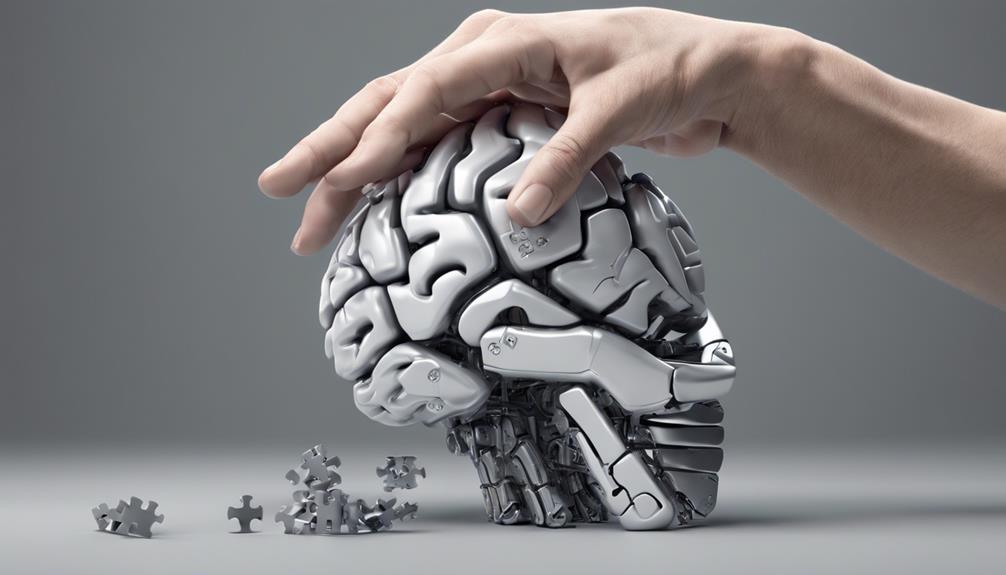
As we delve into the ethics of artificial intelligence, it's crucial to consider how these technologies affect our values and societal norms. You're interacting daily with systems that learn from vast amounts of data, which includes personal information. It's vital to ask who governs this data and the implications of its misuse.
The power AI holds can't be underestimated. You've got algorithms that can shape public opinion, influence elections, and even affect your job prospects. This power brings up significant ethical questions. Who's responsible when AI makes a decision that harms someone? How do you ensure these technologies are used fairly across different communities?
You must also think about the transparency of AI systems. As AI becomes more integrated into your life, understanding why and how decisions are made by these systems becomes crucial. Without transparency, it's nearly impossible for you to trust or verify the actions taken by AI.
AI's Role in Healthcare
AI is transforming healthcare by enhancing diagnostic accuracy and personalizing treatment plans. Imagine you're a doctor struggling with complex cases—AI tools have now become your reliable assistants, quickly analyzing medical data far beyond human capabilities. They're not just crunching numbers; they're identifying patterns in patient information, leading to earlier and more precise diagnoses.
For you as a patient, this means receiving a customized treatment strategy tailored specifically to your genetic makeup and lifestyle. AI's integration doesn't stop there. It's also revolutionizing patient monitoring. Wearable technology equipped with AI algorithms can now track your vital signs in real-time, alerting healthcare providers to potential health issues before they become severe.
Moreover, AI is playing a pivotal role in drug development. By simulating how new drugs interact within the human body, AI drastically cuts down on the trial and error of pharmaceutical research. This not only speeds up the creation of effective medication but also reduces the risks associated with human trials.
Thus, AI in healthcare isn't just a tool; it's becoming a fundamental component of how care is administered, directly enhancing your health outcomes and ensuring treatments aren't only effective but also significantly safer and quicker.
Economic Impacts of AI Adoption
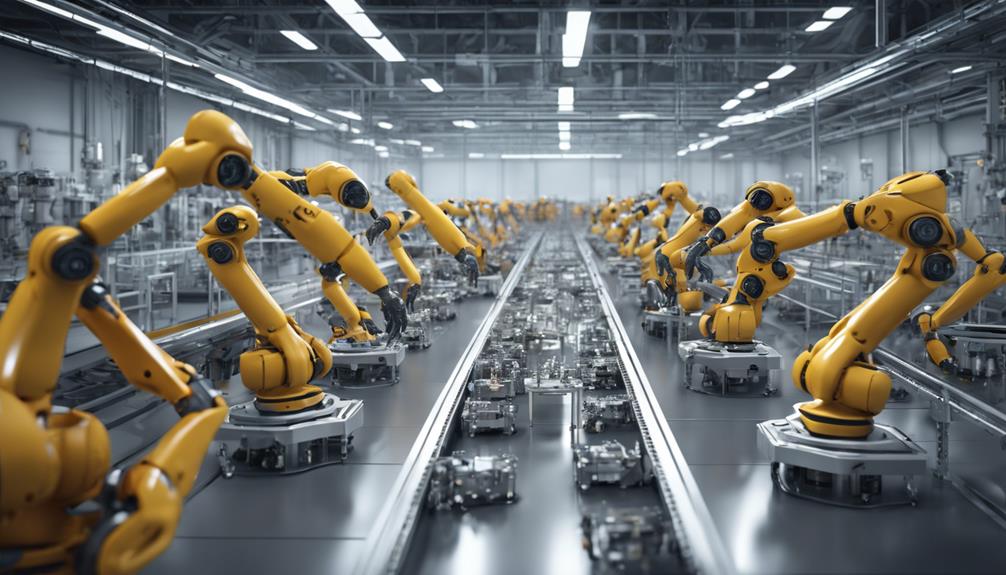
While AI significantly enhances healthcare, it also reshapes economies by altering job markets and productivity levels. You've likely noticed the shift in industries where AI integration leads to job displacement but also creates new opportunities.
For instance, repetitive tasks are increasingly automated, freeing you and your colleagues to tackle more complex challenges, potentially elevating your role within the company. However, this shift demands that you adapt and possibly acquire new skills to stay relevant.
Beyond job displacement, AI propels productivity to new heights. It's not just about working faster; it's about working smarter. AI tools analyze large datasets quickly and with precision, enabling you to make informed decisions swiftly.
This efficiency isn't confined to tech companies. From manufacturing to retail, AI's predictive analytics help streamline operations, reduce waste, and enhance customer satisfaction.
Moreover, AI's influence on the economy is profound, affecting national economic strategies and global trade. Countries investing heavily in AI technology are positioning themselves as leaders in the future economy, which could shift global economic power.
As a professional, understanding these trends is crucial, not only for your career growth but also for grasping where global opportunities might emerge.
Public Perception and Fear of AI
Despite its benefits, many people fear AI could threaten jobs and personal privacy. You might wonder how your data is handled or who's really in control when AI makes decisions. These fears aren't unfounded. Every time you interact with AI, whether it's through social media platforms, virtual assistants, or online shopping recommendations, your data can become a tool for unknown entities.
This uncertainty breeds distrust. You're not alone if you feel uneasy about AI listening in on your conversations or analyzing your online behavior. The idea that AI could one day manipulate or even control aspects of your life isn't just science fiction—it's a potential future that many find alarming.
Moreover, the rapid advancement of AI technologies makes it difficult for regulations to keep pace. You're left wondering if your interests are truly protected or if you're just a data point in a larger algorithm. The balance between benefiting from AI and protecting your rights is delicate and complex.
Understanding AI and advocating for ethical practices is crucial. You have a role in shaping how AI evolves in our society. By staying informed and engaged, you can help ensure that AI develops in a way that respects and enhances human dignity.
The Future of AI and Employment
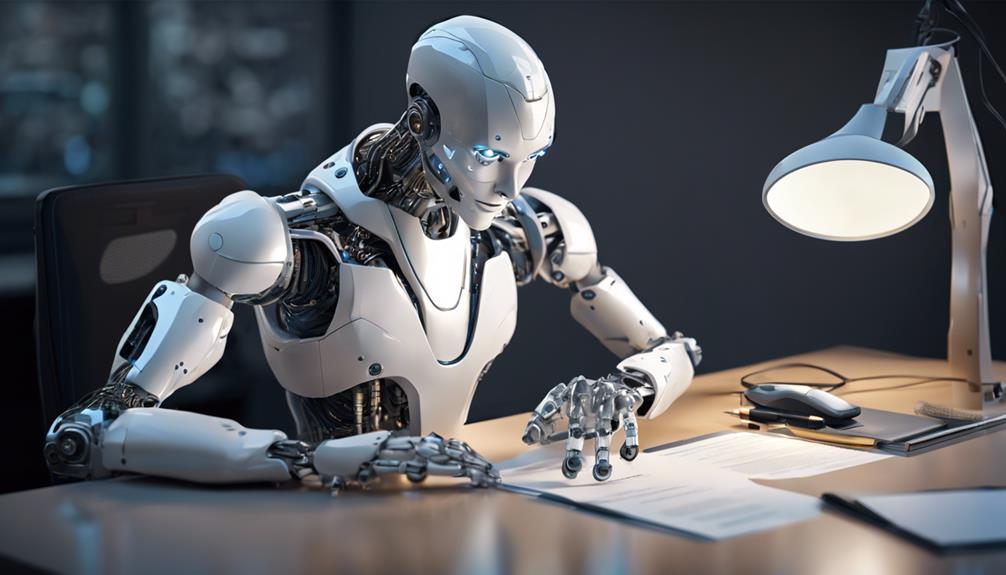
Looking ahead, you might wonder how AI will reshape the landscape of employment. It's clear that some jobs will inevitably be phased out as machines and algorithms become more capable. However, it's not just about job loss; it's also about transformation.
You'll see new roles emerge that are centered around, or heavily integrated with, AI technologies. Take, for instance, AI specialists and technicians who'll be needed to develop, maintain, and improve these systems. You'll also find that jobs in data analysis, cybersecurity, and user experience design will expand, as these areas become more critical due to increased digital dependency.
Moreover, you shouldn't overlook the potential for AI to create jobs that don't yet exist, much like the tech boom introduced roles that were previously unimaginable.
Yet, it's not just the tech sector that'll see changes. Industries like healthcare, finance, and education will increasingly utilize AI to enhance efficiency and personalization. This means you'll likely witness a shift towards roles that require a blend of technical savvy and sector-specific knowledge.
Adapting to an AI-Driven World
You'll need to embrace continual learning and adaptability to thrive in an AI-driven world. As artificial intelligence becomes increasingly integrated into various sectors, your ability to adjust and learn new skills will be crucial. It's not just about understanding technology but also about evolving with it.
You'll find that soft skills like critical thinking, creativity, and interpersonal communication become more valuable as AI handles more routine tasks.
Start by identifying skills that are complementary to AI. For instance, while AI can analyze data, you can focus on interpreting these analyses and making strategic decisions. You can also look into AI certifications and workshops to stay updated with the latest technologies.
Don't forget the power of networking; connect with professionals who are also engaged in this transformation.
Furthermore, consider your mindset. View AI as a tool rather than a threat. By leveraging AI for tedious tasks, you can free up time to engage in more complex and rewarding projects. This shift not only enhances your value as a professional but also increases job satisfaction.
Frequently Asked Questions
How Does AI Influence Daily Personal Routines and Choices?
AI shapes your daily routines and choices by automating tasks, offering personalized recommendations, and optimizing your schedule. It enhances efficiency, but also subtly nudges your preferences and habits over time.
Can AI Technology Enhance Creativity in Art and Music?
AI technology can certainly enhance your creativity in art and music by providing tools that help you explore new styles and techniques, ultimately expanding your artistic horizons and boosting your creative output.
What Are the Environmental Impacts of AI Technology Development?
AI technology's development significantly impacts the environment, including increased energy consumption and electronic waste. You should consider these factors when discussing the sustainability and ethical implications of expanding AI applications in various fields.
How Does AI Impact Children's Education and Learning Methods?
AI impacts children's education by personalizing learning experiences and providing interactive tools, but you need to ensure it's used to complement traditional teaching, not replace it. It's about balance and enhancing educational methods.
What Are the Legal Implications of AI Errors or Malfunctions?
You'll find that AI errors or malfunctions can lead to significant legal consequences, involving liability issues and regulatory compliance. It's crucial to understand who's responsible when technology doesn't perform as expected.
Conclusion
As you look ahead, it's clear that AI is reshaping the job landscape.
It's not just about machines taking over; it's about how you adapt and thrive.
Embrace the change, upskill, and find opportunities where AI enhances your work, not replaces it.
Remember, the future of AI and employment relies on co-evolution.
So, stay informed, stay flexible, and you'll navigate this new era successfully.
The partnership between humans and AI could be more rewarding than you think.






